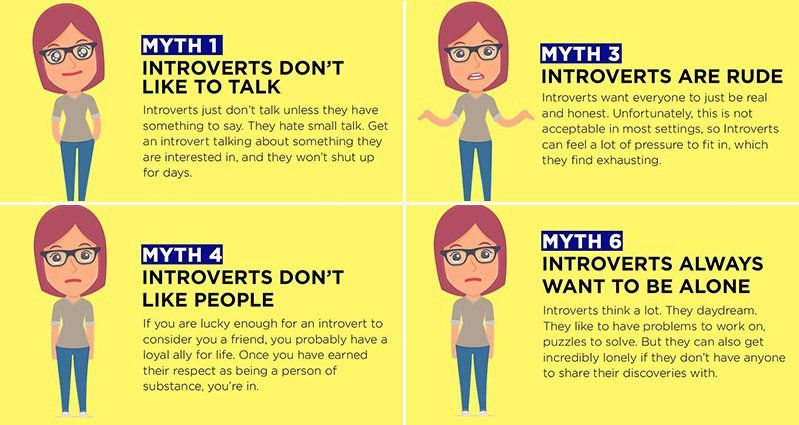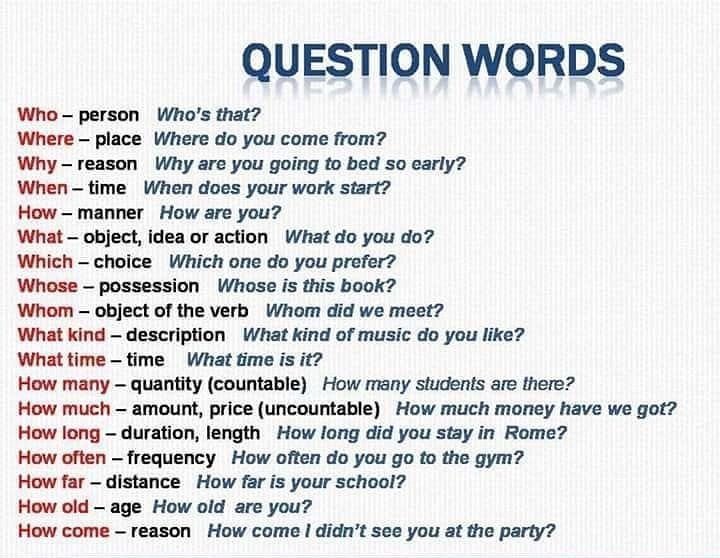Dealing with introverts at work
Managing Introverts: 11 Do’s and Don’ts
Have you ever been tasked with managing introverts in the workplace?
As a business leader, you’ll undoubtedly encounter diverse personality types and working styles among your team members.
People typically fall into one of two camps: People who are more outgoing (extroverts) and people who are more reserved (introverts).
Regardless of whether you’re an introvert or extrovert, managing introverts can involve certain challenges:
- How do you help someone to stand out who may be naturally resistant to the limelight?
- How can you effectively coach introverted employees so that they expand their skill set and work contributions, gain more attention and have a stronger likelihood of being promoted or recognized professionally through some other means?
- How can you create a work environment that inspires them to give their best each day?
So what is an introvert exactly?
What defines extroversion versus introversion could easily consume an entire book.
Within each term, there are different types of sub-personalities and a spectrum on which individuals reside. Comprehensive psychological assessments are dedicated to uncovering a tendency for extroversion or introversion, and the ideal job descriptions and working conditions for each unique person.
However, for the purposes of clarity and simplicity in this medium, when we reference introvert here we refer to the broad characteristics that society commonly attributes to these individuals:
- Systematic and structured
- Analytical
- Logical
- Cautious (they don’t usually feel comfortable going by their gut; instead, they want to verify first)
- Preference for planning ahead
- Thrive in being alone and working independently, because they gain energy from quiet reflection
Despite the popular perception, introversion isn’t about being quiet and shy. It’s more about how a person approaches people and tasks. Although they’re more reserved in their approach, introverts are equally creative, passionate, energetic and articulate as extroverts.
Why introverts make great employees and leaders
Introverts can be valuable assets to their companies. Many occupy leadership positions at companies around the world.
A list of qualities associated with introverts that explain why they make great employees and leaders:
- They tend to be good listeners.
- They excel at thinking critically and usually think carefully before acting.
- They’re often less emotional, especially in stressful or challenging situations.
- They tend to explore problems from many angles and are able to get to the bottom line of an issue.
- They’re conscientious about their work in that they take time to ask the right questions – and it could involve an extensive line of questioning – to ensure they fully understand their tasks.
- They emphasize quality and accuracy in their work – they want to get it right.
- They set very high standards for themselves.
- They’re more compliant with following rules and procedures.
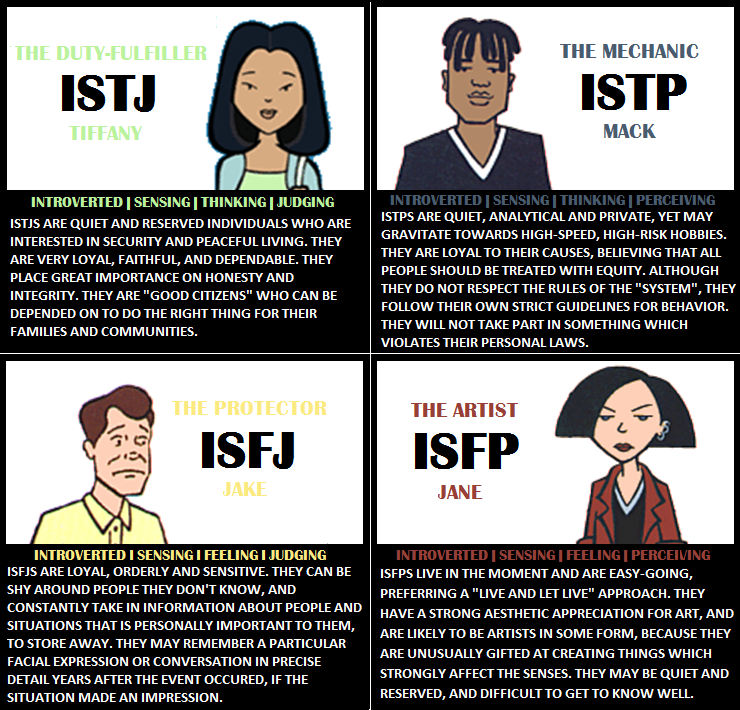
- They usually have superior written communication skills.
- They’re typically detail oriented.
Qualities that can hold introverts back in the business world
On the other hand, with these positive qualities come some less favorable tendencies that can hinder introverts from gaining notice for their contributions or advancing to leadership positions.
These qualities are the reason why managers sometimes need to coach their introverted team members:
- They can appear hesitant to share opinions and ideas with others.
- They can seem paralyzed by over-analysis, fear of mistakes or the quest for perfection.
- Their need to verify can result in them coming off as distrustful.
- They can be slow to give approval or make a decision.
- They can be more rigid in adhering to rules when occasionally some flexibility is necessary.
- They can micromanage or be overly critical of fellow team members.
- They can be resistant to face-to-face communication, instead relying on less personal forms of communication such as on text, email or social media – even when that method may not be optimal for a particular situation.
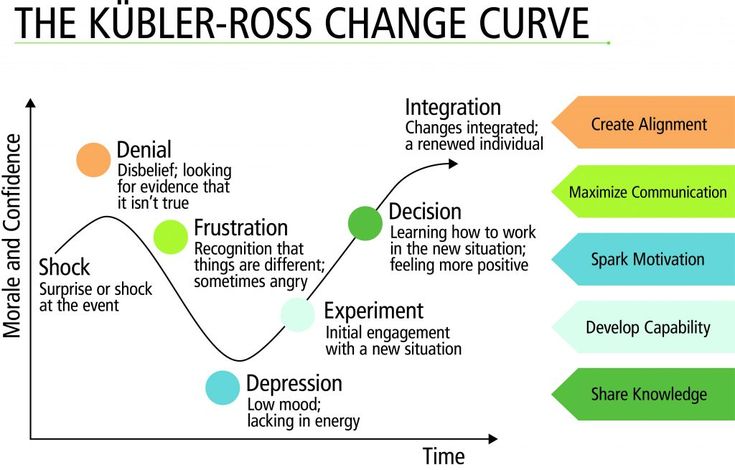
- Their preference for working alone is at odds with the team-based, collaborative approach that many employers favor. It can also prevent them from making valuable professional connections or enjoying opportunities to gain attention when needed.
Do’s and don’ts of managing introverts
Do: Become savvy at recognizing introversion.True, you’re probably not a professional psychologist who’s qualified to diagnose personality types. But that doesn’t mean that you can’t pick up on key indicators that someone likely leans toward introversion:
- This type of employee won’t be the first one to speak up. Instead, they’ll listen more than talk. But when they do speak, they’ll ask questions intended for clarification and avoid long, verbose comments.
- They pay attention to details.
- They don’t reveal much emotion.
- They’re more methodical and structured in how they like to complete tasks.
- They don’t need a lot of interaction with people.
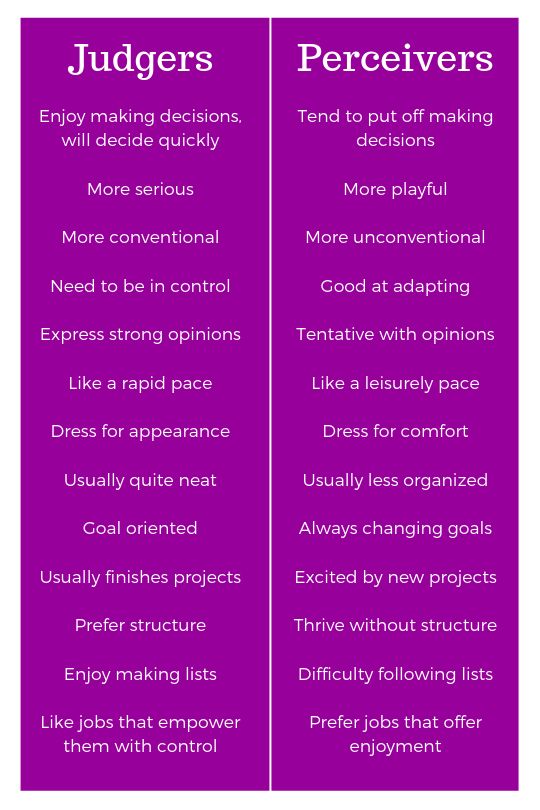 They want to be able to ask their questions and understand their task, and then focus on their task alone.
They want to be able to ask their questions and understand their task, and then focus on their task alone.
The essence of good servant leadership is to try to meet the needs of the people under you.
It’s critical to help people achieve their goals by understanding their perspectives and what they’re trying to accomplish. You want your employees to feel valued and supported for who they are and what they can offer your company.
People who don’t feel valued and supported:
- Become unhappy
- Make mistakes
- Don’t produce good work
- Bring negative energy to their team
- Leave sooner or later
None of this is good for your company.
Do: Leverage your employees’ natural tendencies.- Do your introverted employees feel more comfortable asking a lot of questions upfront?
- Do they like to take time to ponder before giving you their opinion?
- Do they need extra time to research before discussing an issue at a meeting?
- Do they have a favored process for completing certain tasks?
Let them do what they do best. Allow them to work how they feel comfortable.
Allow them to work how they feel comfortable.
Understand the motive behind their actions, which is usually that they just want to do a good job. So give them what they need to succeed.
Ultimately, it means a better work product for you.
Do: Create an environment in which everyone feels comfortable speaking up and sharing, and in which all communication styles are respected.Managers must set the expectation from the outset that everyone on the team knows it’s OK to be themselves.
Each person should understand that they bring a unique style for thinking and sharing. That is, after all, the power of a team.
In meetings or other group settings, some people will talk more and some will talk less. The people who talk more can annoy those who talk less, and the people who talk more may wonder why others aren’t talking as much.
You should uproot the idea that people who do things differently are wrong or inferior. An environment of trust and mutual respect is critical.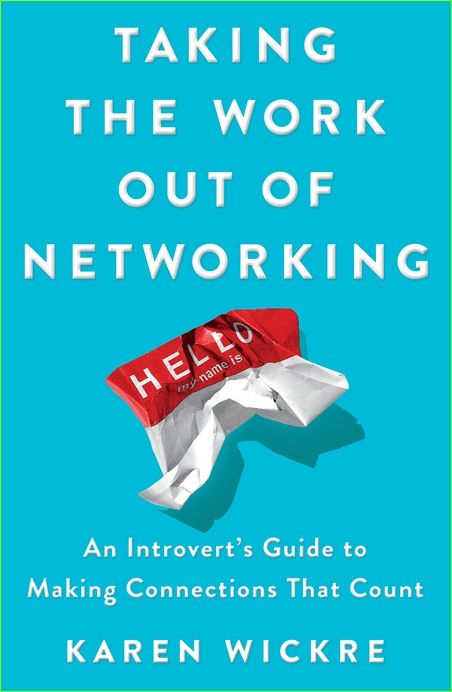
Introverts may try to stay quiet in a meeting. Left to their own devices, they may not say anything at all.
However, it’s important that you draw them out and encourage them to voice their thoughts. Your team can benefit from their perspective and better understand who they are.
And speaking up more can help introverts gain respect among colleagues and be seen as more valuable to the company.
Tips for encouraging introverts to speak up:
- Share topics of discussion in advance so they can come to a meeting prepared and not feel put on the spot.
- Tell them it’s OK to take time to think about an issue or a question.
- Ask them directly what they think once others have shared their ideas.
- Strongly discourage negative feedback from other team members. It’s one thing to objectively explain why an idea may not work, and it’s another to allow teasing, sarcasm or personal critiques. There should be no overt inhibitors that prevent people from wanting to contribute.

Tips for communicating with introverts:
- Don’t disturb them in the middle of a task unless necessary.
- Provide time for them to gather their thoughts and process the information you’ve delivered.
- Offer thorough answers to their questions and detailed explanations for tasks.
- Choose your words carefully when making corrections. Be tactful.
- Be specific in your praise and in your critiques (without being overly flattering).
- Don’t react negatively to a controlled, less emotional response.
- Honor their need for privacy and dignity.
- Allow them space to recharge without interruption after a conversation.
- Demonstrate acceptance and tolerance.
We all have skills we need to master to achieve personal and professional growth.
For introverts, good training opportunities could focus on:
- Learning about different personalities and working styles (for example, how to work well with extroverts)
- Public speaking and how to give engaging presentations
- Networking effectively
With their focus on perfectionism, accuracy and quality, introverts can be incredibly hard on themselves. This is a good thing – to a certain extent. People should take pride in their work.
But when it causes “analysis paralysis” or leads to frustration, discouragement and burnout, you have a problem.
How to avoid this:
- Help your team members set realistic and achievable performance goals.
- Guide them in adjusting standards for themselves. Clearly stating your expectations can help them determine if their standards are in alignment with yours – or if they’re going overboard.
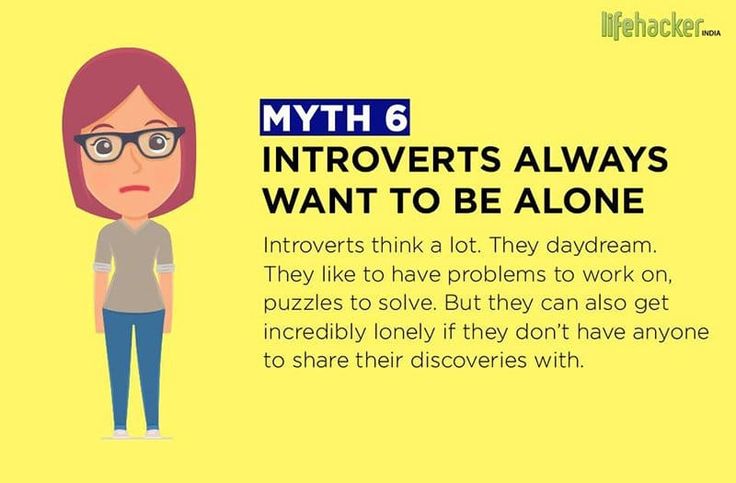
- Explain to them which tasks deserve more attention.
It’s a fact of doing business:
We must work with people who are different from us.
Whether we’re polar opposites from our colleagues or a bit too much alike, it’s not uncommon for managers and direct reports to butt heads or become annoyed with how the other works.
However, always keep this in mind: People aren’t doing things against you; they are usually doing things for themselves. We do what we need to do to cope within an environment.
As a manager, helping your employees do their job well – and meeting their needs so they can accomplish their goals – should be meaningful to you if it’s meaningful for them.
- Slow down and be patient.
- Answer questions.
- Clarify instructions.
- Make it clear that they’re worth your time.

Training is the act of developing a specific skill while leveraging one’s natural talents. It should never be confused with trying to change who someone is at their core.
You can’t.
Trying to do so will only undermine your employee’s confidence, foster resentment and cause unnecessary stress.
Don’t: Push an introvert into the limelight if it’s undesired and unnecessary.Unsurprisingly, many introverts don’t want to be under the spotlight.
Heaping attention on them can embarrass them and make them uncomfortable. They could be perfectly content operating behind the scenes, and you should respect that.
Unless being the center of attention is directly related to their job function or professional status – for example, being featured in a publication or speaking at a conference – then don’t force it.
When it comes to day-to-day recognition of a job well done, be creative and more subtle in how you honor introverts. Peer recognition is a great, more personal and quiet way of passing on the kudos.
Introverts have high expectations of themselves and others – including you as a leader. If your team second-guesses your capabilities as a leader, it can undermine morale, promote disengagement and cause people to leave.
- Hold true to your standards, as well as the rules and procedures you’ve set.
- Keep the promises you’ve made.
- Be excellent at what you do.
Summing it all up
Introverts have many outstanding qualities that their managers can leverage and develop to their companies’ benefit.
While managing introverts, your responsibility is to help develop their natural skills and boost their comfort and confidence level in the workplace — so that they can achieve the credit, respect and career advancement they’ve earned.
In the process, you can help the various personalities on your team to collaborate more harmoniously and effectively, enhance the quality of work and improve employee retention.
For more information on how to better support, develop and motivate your team, download our free magazine: The Insperity guide to leadership and management.
Crystal Knows - How to Deal With Introverts in the Workplace Environment
Having introverts in the workplace should be met with patience and understanding, as sometimes the work environment can be overwhelming and stressful. Especially in a more extroverted work environment, it is easy for introverts to be overlooked or misunderstood. Learning about your introverted colleagues' personalities and preferences can be extremely useful in maintaining a healthy and effective workplace.
Understanding introverts in the workplace
Introverts may be defined as quiet people who are introspective and enjoy time spent alone. People with personalities characterized by introversion tend to keep to themselves and prefer solitude over a social hour. In contrast to their extrovert counterparts, they thrive in quieter, more subdued environments.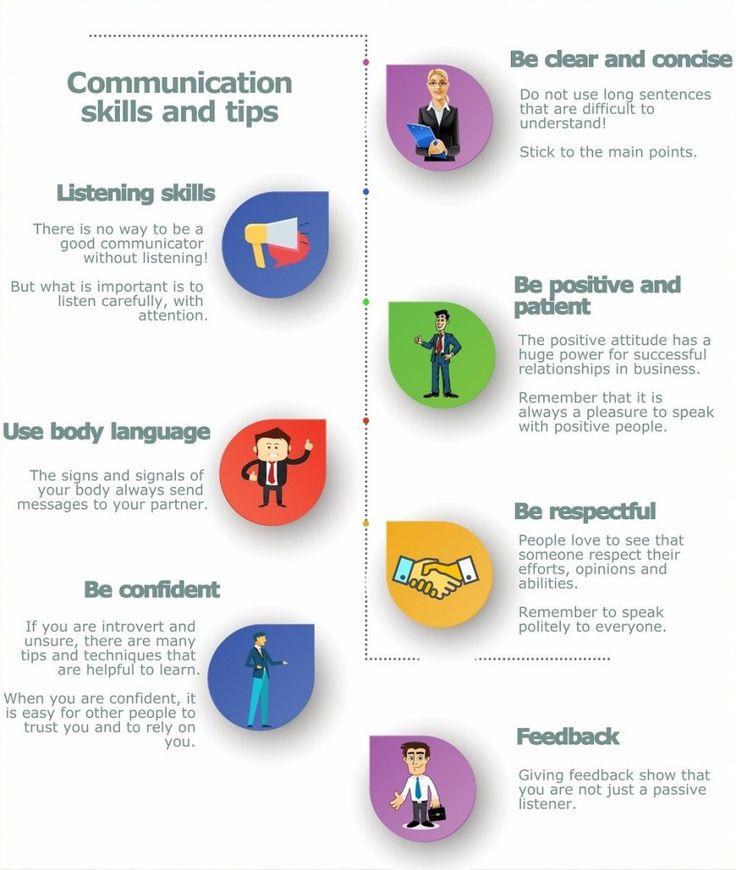
This article will cover tips on how to deal with an introvert in the workplace and describe the type of environment an introvert enjoys working in. Keep in mind, while it is pretty easy to determine whether someone is an extroverted or introverted employee, it can be beneficial to learn more about the different personalities that make up the work environment. Get started by taking a free personality assessment.
How to identify an introvert at work
While some people enjoy water cooler conversations and social lunch hours, others prefer to keep to themselves. In an office, an introvert employee will avoid most social interaction and instead keep their head down and work through their projects independently. Read on to learn about the different ways you can identify an introvert in the office:
Prefers to work independently
Introverts do their best work alone and in a quiet space. Working in a collaborative, group setting might be draining for them and may decrease their productivity.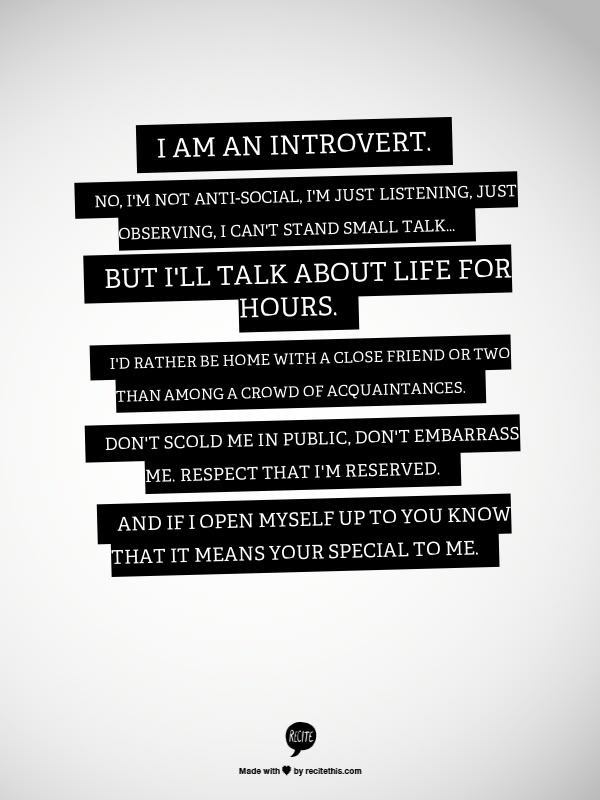 When introverts can work independently, they have the space and privacy to organize their thoughts. They do their best thinking and brainstorming, free from any distraction or pressure they may feel in a collaborative space.
When introverts can work independently, they have the space and privacy to organize their thoughts. They do their best thinking and brainstorming, free from any distraction or pressure they may feel in a collaborative space.
Very meticulous and structured
When completing projects, introverted personality types tend to prefer to work with a structured and detailed plan. When working, they may utilize lists and other tools to keep them organized and on track. Before feeling comfortable beginning a project, introverts typically will need all of the details and deadlines plenty of time in advance.
Prefer written communication over face-to-face meetings
Introverts will usually avoid small talk, or any other unnecessary social interaction, at all costs. If it can be written in an email, people with introverted personalities will do so, and hope you do the same for them! Introverts take time to organize their thoughts; with written communication, they value reflecting without having to respond on the spot.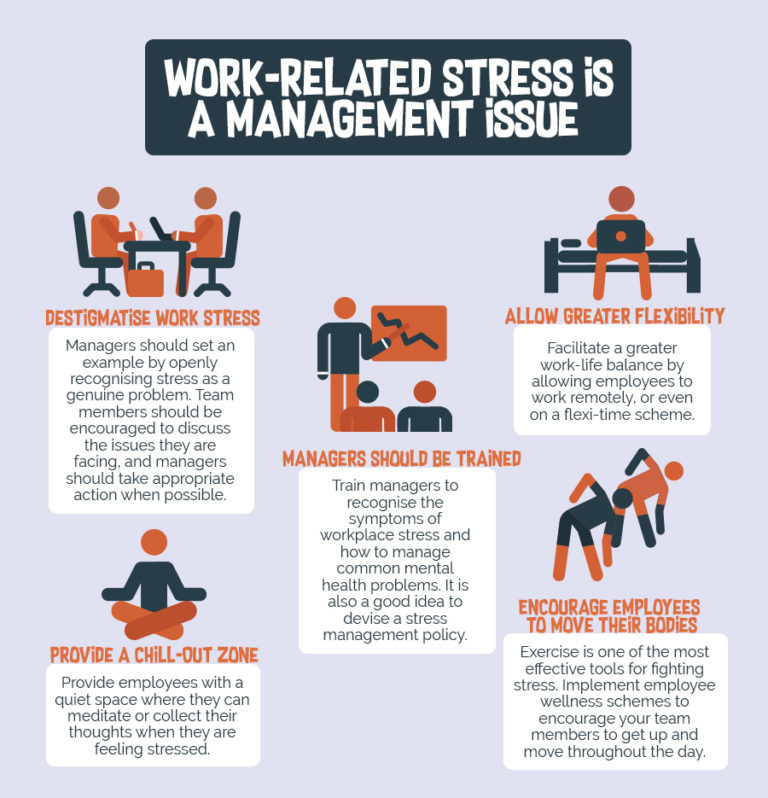
Need a routine and set duties
Because introverts are natural planners, they need set routines for their days and duties. They do not do well in more spontaneous roles with undefined responsibilities. They prefer positions that allow them to do their responsibilities each day without much variance or surprise factor to their schedule. If tight deadlines and random projects are sprung on them, they will quickly feel burnt out and frustrated.
Energized by alone time
After a long and exhausting week, introverts would instead pour themselves a glass of wine and hang out on the couch rather than attend a lively social event. To avoid feeling completely drained, introverts need to reserve time to be alone and decompress. This makes it easy for them to be perceived as antisocial team members or just plain rude-- when that isn't the case at all.
Still unsure of whether you or someone you know is an introvert? Try taking our free personality test today!
How to deal with introverts at work
Because independence is one of their strengths, introverts may struggle to participate and thrive in a more collaborative group setting.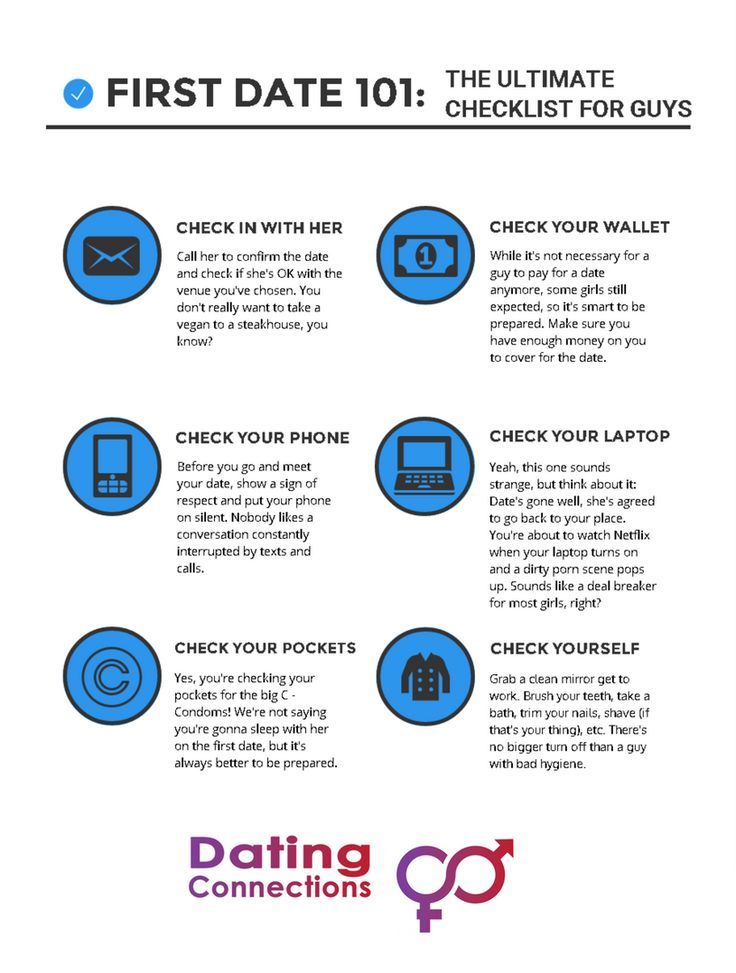 In an office, there is sometimes an unspoken expectation to socialize with other team members; this leads to introverts being often perceived as antisocial and rude or dismissive. Luckily, you can take steps when dealing with introverts at work to ensure a harmonious and accepting work environment.
In an office, there is sometimes an unspoken expectation to socialize with other team members; this leads to introverts being often perceived as antisocial and rude or dismissive. Luckily, you can take steps when dealing with introverts at work to ensure a harmonious and accepting work environment.
1. Do not try to change their personality
Instead, learn about it and learn how to work best with it. Each person has a unique set of skills and abilities, partially thanks to their personality. With each different type comes fresh perspective, innovative ideas, and unlimited motivations. In a team setting, everyone is contributing their strengths and doing their best to avoid their weaknesses. As introverts, these employees have quite a lot to offer and often make valuable contributors. To leverage your introverted employee's natural tendencies and strengths and develop them more to the company's benefit, listen more to figure out what your introverted employee needs to feel supported and do their best work rather than changing who they are and how they work.
2. Give them space to work by themselves
Introverts value their alone time and often prefer solitude rather than group settings. They are most productive when free from distractions, such as a busy office or loud common area, and alone with their thoughts. Those thoughts generally need time to be organized, so working independently allows introverts to do so without the pressure of group work.
3. Help them speak up
Introverted employees won't always speak up when they should and may struggle to voice their concerns or opinions in a group setting. This may mean speaking to them privately or notifying them in advance that you'd like them to participate in the next meeting. Doing so allows them the time they need to organize their thoughts and think out what they will say. Because of all the thought they put into their words and have careful attention to detail, it is important to listen when they do speak up!
4. Use written communication
Introverts are typically more comfortable with written communication instead of face-to-face conversations. People with introverted personalities tend to feel drained from frequent social interactions, so they greatly appreciate receiving an email rather than a meeting invite. If you opt for written communication, you also show your introverted employee that you respect their preferences and want them to feel comfortable in the office.
People with introverted personalities tend to feel drained from frequent social interactions, so they greatly appreciate receiving an email rather than a meeting invite. If you opt for written communication, you also show your introverted employee that you respect their preferences and want them to feel comfortable in the office.
5. Educate yourself
Introverted or extroverted, personality plays a significant role in how people interact and respond to different stimuli in and outside the work environment. Educating yourself on your coworkers' or employees' personality type, communication style, and other work preferences can help foster a more unified and peaceful work environment. Taking the initiative like this also shows that you respect your colleague and value their time and effort as a team member, leading to more effective and productive collaboration and communication.
How to create the best work environment for introverts
Rethink the workday
Be mindful of the preferences of both your introvert and extrovert team members. Perhaps your more introverted employees could benefit from the option to work remotely or from a "no meetings before lunch" rule. Maybe the open office floor plan prevents introverted people from working most effectively, and they could benefit from a quiet space to do their duties. There are many ways to balance the workday to be respectful of everyone's preferences and needs in the office environment; take some time to think of how you could be catering to your team members' needs.
Perhaps your more introverted employees could benefit from the option to work remotely or from a "no meetings before lunch" rule. Maybe the open office floor plan prevents introverted people from working most effectively, and they could benefit from a quiet space to do their duties. There are many ways to balance the workday to be respectful of everyone's preferences and needs in the office environment; take some time to think of how you could be catering to your team members' needs.
Don't impose tight deadlines or spontaneous projects
Because people with more introverted personalities prefer to take their time and put a lot of thought into their projects, it is best to give them plenty of time to complete them. Avoid imposing deadlines without enough advanced notice and expectation clarity or asking them to work on a spontaneous project, as it can add stress and pressure to their day. While some people may be energized by unexpected projects, introverts will typically feel drained and pressured by them. Introverts thrive in more independent roles with structure and routine, so avoid straying too much from their defined duty expectations.
Encourage extroverts to listen better
When integrating a more introvert-friendly work environment, it is necessary to get your more extroverted employees on the same page. People characterized by extroversion typically enjoy collaborating and frequently socializing with their colleagues. Introverted employees' preference of working independently may conflict with a more team-based approach, so your more extroverted employees must be aware and respectful of this. Encourage the extroverts in the workplace to listen more to their introverted coworkers and be more understanding of their working styles so that everyone in the office space is comfortable coming to work.
Prioritize team-building
While team-building may seem counterintuitive given introverts' tendency to keep to themselves, it is necessary to make them feel a part of their team. They may struggle with building professional connections and may otherwise not initiate a conversation with their team members. Encouraging friendly conversation and connection through team-building exercises can help introverts feel more comfortable in their workspace and more confident approaching coworkers for help or collaboration. Be careful not to push any social events because introverts do not want to feel pressured to socialize. Instead, offer plenty of details, defined guidelines, and lots of time to prepare--if they choose to participate.
They may struggle with building professional connections and may otherwise not initiate a conversation with their team members. Encouraging friendly conversation and connection through team-building exercises can help introverts feel more comfortable in their workspace and more confident approaching coworkers for help or collaboration. Be careful not to push any social events because introverts do not want to feel pressured to socialize. Instead, offer plenty of details, defined guidelines, and lots of time to prepare--if they choose to participate.
Evaluate based on performance
When you evaluate based on performance and not personality, introverted employees stand a better chance at receiving positive feedback. Because they tend to be more reserved and independent, introverts are often overlooked in the workplace. It can be highly discouraging for introverts to feel that their hard work is not being appreciated. While personality can play a role in performance, it is crucial to reward based on other factors.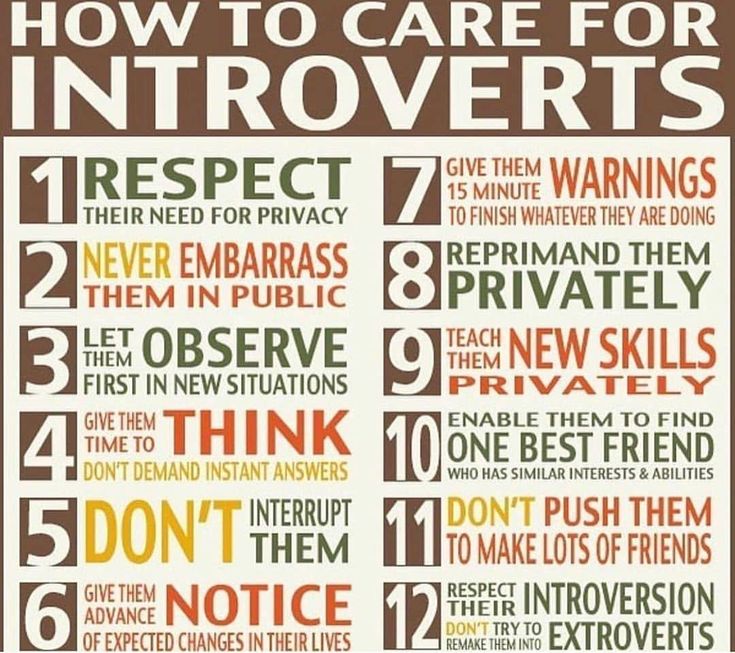 While introverts and extroverts may approach different scenarios or projects in entirely different ways, one is not better than the other. Introverts have excellent attention to detail and a meticulous mind, which should not go unnoticed in the workplace!
While introverts and extroverts may approach different scenarios or projects in entirely different ways, one is not better than the other. Introverts have excellent attention to detail and a meticulous mind, which should not go unnoticed in the workplace!
Best positions for introverts at work
People with more introverted personality types tend to do best in roles where they can work independently and within a structured routine. When managing introverts in the workplace, remember that while they can perform well in any role, they tend to be happiest in positions aligned with their preferences (as discussed above). Here are some examples of good jobs for introverts:
Accountant
Accountants typically work to support a company's finance department or work with individuals to file taxes or check financial records. Essentially, their job is to examine financial documents and statements for accuracy and ensure all financial records and statements align with laws, regulations, and generally accepted accounting principles (GAAP).
Software Engineer
Software engineers research, evaluate, design, and write new software programs or computer systems. They must carefully analyze a situation and use proven solutions to create a reliable fix. Their duties require many stable, secure solutions that help build strong foundations rather than riskier, more out-of-the-box ideas that could potentially lead to problems.
Scientist
Science is a broad subject, and there are various scientist roles across very different industries and fields; scientists in any field tend to explore and analyze the physical world, following set procedures to make legitimate discoveries
Actuary
Actuaries work within the insurance industry, and their duties are usually to assess risk and advise companies on whether to pull out policies for certain clients. An actuary will use their knowledge from examining the numbers to minimize financial risk for their contractors
Editor
Editors review and edit content pieces, taking them from rough drafts to publication-ready. Along the way, they may correct grammatical errors, help with sentence structure and clarity, and make other suggestions for the writer to improve the piece.
Along the way, they may correct grammatical errors, help with sentence structure and clarity, and make other suggestions for the writer to improve the piece.
IT Specialist
IT specialists work heavily with computer information systems and often are in charge of all computer-systems related needs and activities of an organization. These roles are perfect jobs for introverts because they require skilled attention to detail and are best suited for independent workers.
Just because a person has an introverted personality does not mean their career options are limited. There are plenty of exciting jobs for introverts to make meaningful contributions while still honoring their preferences and needs.
Introverts at work: Key takeaways
Introverts are not limited in their abilities to perform, contribute, or rise to leadership positions. Their skillset often includes being good listeners, having careful attention to detail, and being introspective when working or making decisions--making them a valuable asset to any team.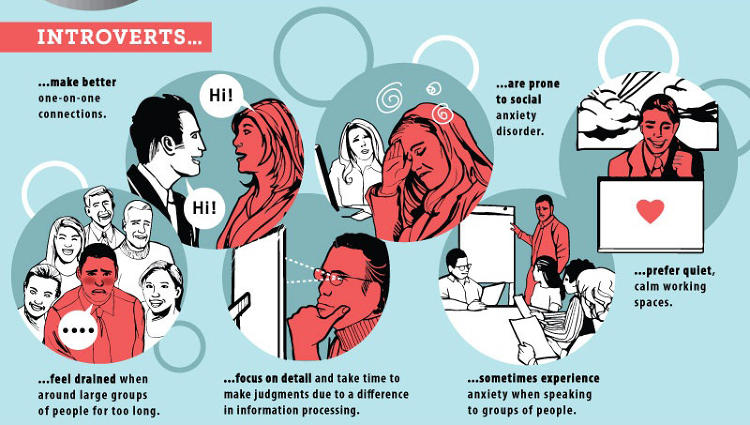 Most people fall somewhere in the middle of the introvert vs extrovert spectrum, with a tendency to lean more one way than the other. Learning about your introverted employees' preferences and needs can make all of the difference when creating a work environment that is suitable for everyone. Take special care to consider the needs of introverted colleagues, and remember not to take it personally if they choose not to participate in group or social settings!
Most people fall somewhere in the middle of the introvert vs extrovert spectrum, with a tendency to lean more one way than the other. Learning about your introverted employees' preferences and needs can make all of the difference when creating a work environment that is suitable for everyone. Take special care to consider the needs of introverted colleagues, and remember not to take it personally if they choose not to participate in group or social settings!
Are you an introvert? Find out by taking a free personality test!
Introverts at work: how to make their life easier?
Career and self-realization
Psychological tests show that introverts make up one-third to one-half of the population . Susan Cain's book about their plight has sold 2 million copies. The TED lecture, which outlines the main ideas of the book, has collected more than 14 million views. And for the first time, Carl Gustav Jung drew attention to the difference between introverts and extroverts back in 1921. But every day the conditions for introverts in the work environment are only getting worse. nine0003
But every day the conditions for introverts in the work environment are only getting worse. nine0003
Aggressive environment
The main culprit for this deterioration is the vogue for office "open space" and so-called group work. Business leaders believe that in a world where computers do a lot of routine work, innovation is the elixir of growth. But from this fair premise, they draw the false conclusion that the best way to boost creativity is to tear down office walls and keep meetings running non-stop.
Thinking this way is wrong for a number of reasons. This judgment is based on a hackneyed comparison of intellectual and physical barriers between people. It does not take into account the fact that noise and distractions make it difficult to concentrate. nine0003
Extroverts do get their energy from other people. But introverts need time alone to recharge. Companies forget this too often!
Inconspicuous leaders
The recent fashion for "hyper-connectedness" of everyone with everyone also reinforces prejudice against introverts when it comes to promotions. In many corporations, it is customary to equate leadership qualities with extroversion—that is, with the desire to project your self outward, shake hands, and rant in front of an audience. This means that the ideal manager is Donald Trump. nine0003
In many corporations, it is customary to equate leadership qualities with extroversion—that is, with the desire to project your self outward, shake hands, and rant in front of an audience. This means that the ideal manager is Donald Trump. nine0003
However, management guru Jim Collins shares an observation that the longest-serving CEOs in their field are generally quiet and even inconspicuous people. They put their company above their own "I" and often keep a low profile.
Bill Gates or Mark Zuckerberg are introverts who would have a hard time staying afloat in an extroverted culture it's hard to stay afloat in IBM's extroverted culture, with its corporate anthems and strong emphasis on team spirit. By hurting employees like them, firms overlook or marginalize potential leaders. nine0003At all levels of the corporate hierarchy, this leads to the fact that the abilities of employees are not fully used.
Adapting working conditions
How can companies improve the lives of introverts? At the very least, provide them with individual space and quiet areas for relaxation.
And recognize that introverts bring their unique skills to work. In meetings, they talk less, but their words make more sense.
Leaders will have to look at their companies through the eyes of an introvert . How often do large meetings take place in the organization, where the loudest ones have an advantage? This leads to the marginalization of introverts. Are new hires selected based on how they present themselves in interviews? Because of this, those who know how to work, but do not know how to present themselves, go unnoticed.
The most astute leaders have already begun to meet these challenges. Amazon has made its meetings more focused. Each of them begins with silence: those present read a six-page text on the topic of the meeting. This shifts the focus from the behavior of people in the audience to the discussion of what they have read. nine0003
Google has moved away from focusing on interviews and is focusing more on how they perform on tests, whether it's coding or solving technical problems.

Building a team
Of course, managers are not up to date with all scientific achievements in the field of personality typology. But it would be useful for them to know how teams are created and how groups of people interact with each other. If employees must simply follow orders, then extroverts will do better with management. But if employees must think for themselves, then introverted leaders are more successful. nine0003
Introverts have to work harder to adjust to corporate life because work is primarily a social interaction. They find it easier to communicate using the keyboard than in meetings. But instead of avoiding meetings entirely, it's better to have small meetings, as this is necessary for moving up the corporate ladder.
Introverts who have reached career heights are usually able to behave like extroverts at least part of the timeIntroverts at the top of their careers tend to be extroverted at least part of the time, says Carl Moore of Montreal's McGill University, who interviewed 200 CEOs on the radio show.
The former head of the Canadian State Railways, Claude Mongeot, set himself the goal of acting like an extrovert five times a day.
Most of humanity is located on the introversion-extroversion scale somewhere in the middle between the extreme marks of . Carl Moore suggests that "quiet" people can have just as much impact on the world as true extroverts, if only they have time to reset. He challenges his students to "communicate and relate like an introvert" or "communicate and relate like an extrovert" to empower them. nine0003
Enlightened management of the future
Business has long been dominated by the extrovert ideal, because that’s how corporate fashion has been set up for decades—whether it’s the 1950s model, when an employee asserted himself in an organization by defending his point of view in meetings and in a team, or the current obsession with instant communicative response. Susan Kane writes about this in her book.
Fortunately, some trends are directed in the other direction.
The technology industry, that is, the industry where there are especially a lot of introverts, has facilitated remote communication. The purpose of enlightened management is not to push an extrovert-oriented company towards introverts. It's about building a new type of company where introverts, extroverts, and everyone in between have an equal opportunity to thrive professionally. An ambivert organization, let's call it that. nine0003
The article mentions the book by S. Kane “Introverts. How to use the features of your character” (MIF, 2014), as well as thoughts from the book by J. Collins “From good to great” (MIF, 2016).
Text:Daria GromovaPhoto Source:Getty Images
New on the site
"Everything will return": why we believe in karma - the psychological aspect
"I told my friend what I was going to give her for the New Year - now we are in a quarrel"
The Joker, Voldemort and the Witch Ursula: why we love movie villains so much
How to stop being angry with your ex: 3 easy steps — follow our instructions
What to watch for parents to better understand their children: 6 Russian and foreign films
How to choose a good psychologist: what to pay attention to and whether to trust reviews on the Internet
“Many people see me as the ideal of beauty, but I find only reasons for disappointment”
A stranger among my own
At school, teachers encourage those who often raise their hand; in the office, management celebrates those who constantly offer something, even if these proposals do not lead to anything.
In addition, everyone likes sociable people, but not closed ones.
We hope that our article will make life easier for those who are uncomfortable even at the prospect of being the soul of a company of strangers, and will be useful for those who consider introverts to be arrogant, eccentric and even asocial personalities and do not hesitate to speak loudly about it out loud. nine0003
A third of the population
It is generally accepted that there are at least 25–30% of pronounced introverts in the world. A third of humanity certainly can not be on the sidelines. They work, live and study together with sociable, noisy, cheerful, aggressive people.
In the office, introverts find themselves in rather painful conditions for them: open spaces, endless meetings, corporate parties and endless birthdays of colleagues, employees' children, and the like. What is left for them? Reconcile? Tolerate? nine0003
According to psychologists and HR specialists, everything is not so scary for introverts, or rather, it is not scary at all if you make some effort.
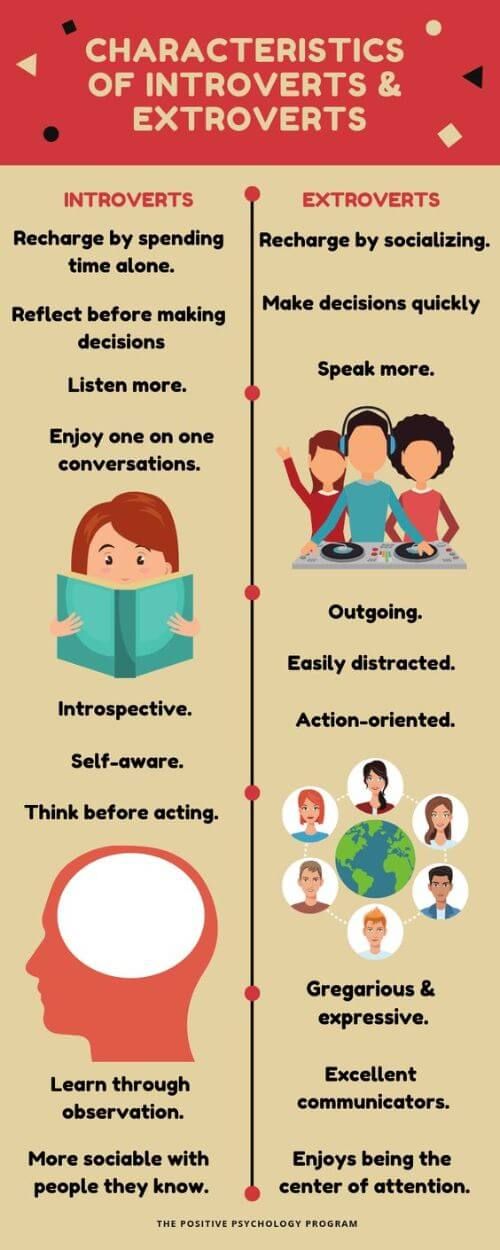
An important condition
Do not try to change yourself (and by the way, extroverts, do not try to change the introvert), because the personality type is not changed. Come to terms with who you are and set yourself up to make your life as productive and comfortable as possible without changing your essence. nine0006
An attempt to change one's character and inclinations too often leads to a deep inner conflict, frustration, and in Russian realities also to alcoholism.
Do not forget that many great and even just successful people are introverts.
Advantages of introverts
Introverts have a lot of inherent qualities that are unique to them, which can easily be turned into advantages that allow you to achieve career and success: nine0003
- are able to plunge deeply into the task - without distraction and with enthusiasm;
- notice the smallest details, observant and attentive;
- often more empathic, sensitive, sensitive towards others - easily feel the change of moods;
- tend to enter into a strong and lasting relationship;
- more independent of other people's judgments and will;
- able to calculate the consequences of actions and decisions, excellent strategists; nine0003
- do not like to argue and prove their case;
- are better at expressing thoughts in writing than extroverts;
- can easily perform leadership functions, if they are not required to constantly present themselves.

Also, introverts often look mysterious, calm and self-confident, which attracts other people to them, especially the opposite sex.
Rules for Survival and Success
Having understood his strengths and weaknesses, an introvert can begin to master the surrounding living space, guided by his internal structure. nine0003
Summarizing what was said by a dozen personnel officers and psychologists, we can offer the following list:
Make warning . In a new team, it is best for an introvert to immediately warn others about the peculiarities of their character. This will give him an indulgence for possible communication problems. For example, if an introvert is called out, but he does not answer immediately, it is easy to attribute it to his psychological type, without being known as unfriendly, withdrawn, strange. nine0003
Simulate normal behavior . An introvert, in fact, does not owe (and it often seems to him that this is exactly what is expected of him) to be the soul of the company, he just needs to create a sense of his presence and participation in office life.
Hence a few very simple rules.
Greet everyone in the office in a friendly manner, calling people by name whenever possible.
- During a break in work, spend some time moving around the office space to light up. At the same time, it is far from always necessary to communicate with someone. Just be. People will get used to the introvert as part of the everyday landscape. And that's enough. nine0003
- Get to know two or three colleagues better and exchange a few words with them in the hallway, in the kitchen, in the smoking room.
Use social media to communicate informally with colleagues and management . In reality, an introvert does not like to flaunt himself.
Another thing is Facebook or Instagram. In social networks, communication is a voluntary thing, and you can interrupt it at any time. This is the safest way for introverts to show their personality or even professionalism. nine0003
By making your accounts available to colleagues and management, you can achieve professional and personal recognition without having to be active in office life and work meetings.
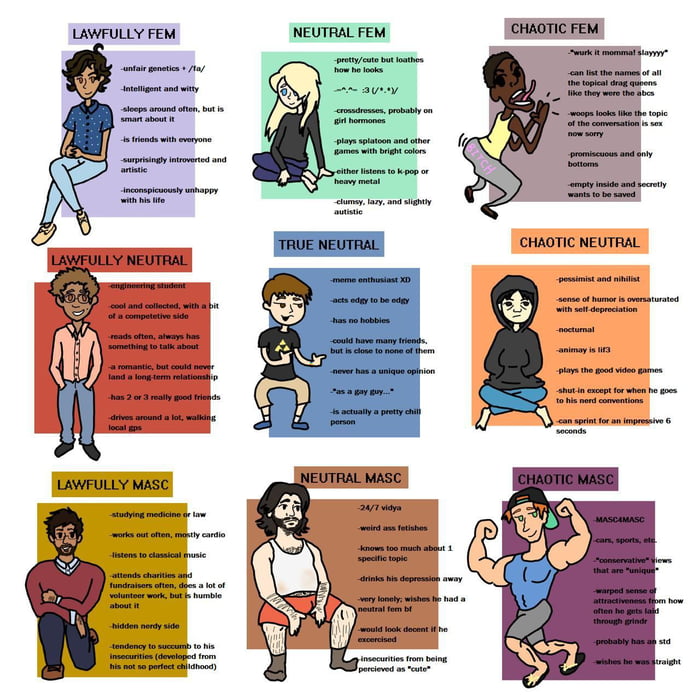
Psychologists have repeatedly tested the owners of well-known blogs and, as a rule, they turned out to be gifted introverts who turned out to be specialists in some issues, excellent photographers, jokers and essayists.
Play inconspicuous but important roles at office, corporate events . An introvert is not obliged to try to make toasts and be at the forefront of congratulations, but he can actively participate in the organization and preparation - bring and bring various important goods - gifts, flowers, alcohol, etc. Help set the table and decorate the room.
During the event, there is one unique and infinitely beneficial role for an introvert - the photographer. You don't need to communicate with anyone. You don't have to participate in anything. Only shoot. But then the whole office will see these photos, and the whole office will know who took the pictures. The permanent role of the photographer-observer allows to avoid any form of publicity at the events.
nine0003
An introvert's workplace is a very important element of adaptation . If it is possible to influence the choice of your location, you should not choose a place where colleagues passing by or sitting next to you can see what is happening on the computer screen, what the hands are doing on the table and the legs under the table.
And another very important element - headphones . It can be just soundproof headphones or headphones with music or some soothing sounds - the sea, forests, etc. It's a matter of taste. nine0003
A quiet, secluded place is necessary for those who do not find peace in the workplace . It can be some kind of remote and rarely visited toilet, an empty meeting room, an abandoned corridor, just a window sill in the stairwell, etc.
Even five minutes in complete solitude allows you to recover well from the abundance of people and unnecessary information that fills the office space.
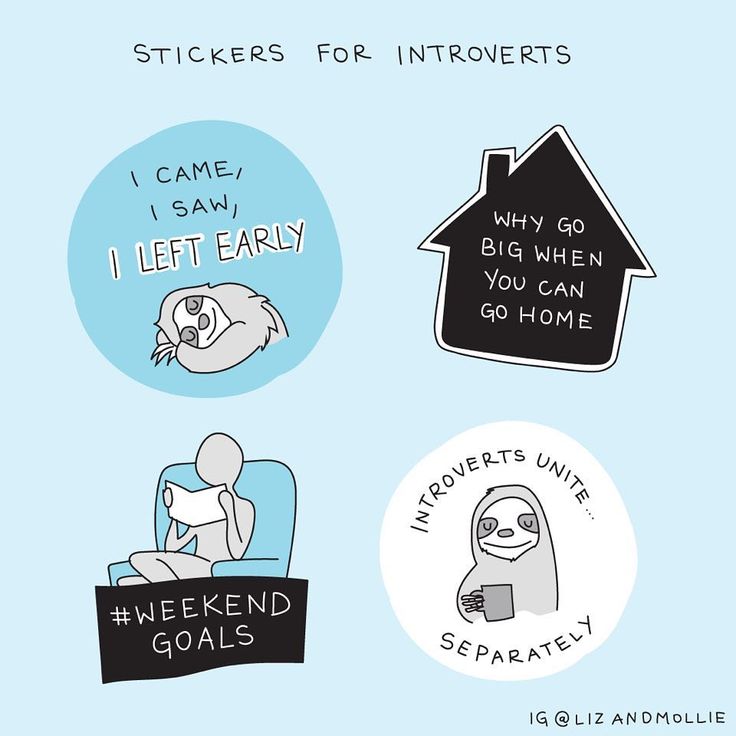
Create an image of a thoughtful professional . You can pass off your own characteristics, and almost any, for the specifics of the work of a professional: I need to think it over, it's not easy, don't be in a hurry etc. This language is usually well-known and used by corporate programmers, system administrators, website programmers working in the company.
Create an image for yourself of the original artist . In some offices, it is enough to dress somewhat unusually (wear a hat, scarf, earring, bright tie, original-looking shoes) and organize a creative mess in the workplace. nine0003
Build personal connections instead of actively participating in collective action . Instead of noisily dominating and participating in discussions, you can build personal connections with people that will be valued even more than the ability to speak frequently on various occasions.
For example, at a meeting you can remain silent, and then calmly discuss the issue with the leader in the smoking room, corridor or his office. So the introvert will look even more serious and thoughtful person. The same is true with colleagues. Discussing work and personal issues with them tete-a-tete is the path to trust. nine0003
Become the manager of . Based on the same principle, a career takes on a special attraction for an introvert.
Introverts, despite their peculiarities, can be excellent managers and leaders. They often have a strategic view of things. If an introvert becomes a leader, he decides many things himself according to his own device and idea of \u200b\u200bcomfortable work.
And by the way, managers don't usually sit in open spaces! nine0003
If your colleague is an introvert
1. Make appointments in advance . If this is not possible, at least warn about the arrival. It is difficult for an introvert to communicate with strangers, and sometimes familiar people.
This does not mean at all that he does not know how to do it, he just needs more time to get together and be ready for communication.
2. Use alternative telephone communication methods . Introverts often avoid telephone conversations and - consciously or not - ignore calls. It is very difficult for him to call somewhere and ask someone, sometimes painfully. nine0003
Fortunately, scientific and technological progress does not stand still: instant messengers, e-mail and CRM systems are a great solution not only for introverts.
3. Do not demand immediate decisions and reactions from introverts . The fact that they do not answer you immediately does not mean that the introvert is stupid, or lazy, or unwilling to talk. Usually an introvert just needs time to think about the answer.
4. Feel free to ask again. Often the perception of an introvert is very different, and he may mean some things a little differently.

Learn more





